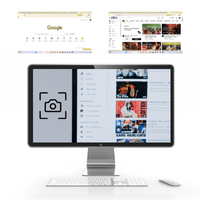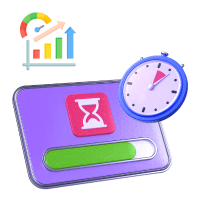In recent years, remote work, or working from home or any location other than a traditional office, has grown in popularity. The COVID-19 pandemic has expedited this tendency, with many people working remotely for the first time. As we look to the future, remote work is projected to expand and change the way we operate. “The Future Of Remote Work: A Comprehensive Guide 2024” looks at what the future holds for remote work, including trends, difficulties, and possibilities. Whether you’re a business owner or an individual, this article will help you understand how hybrid work may affect you.
Remote Work Before 2020: A Glimpse into a Distant Landscape
The digital revolution had paved the way for remote capabilities, but general acceptance remained limited. Companies took careful steps into remote work tools, dealing with issues about productivity, communication hurdles, and the concept of trust when employees were not physically there.
Remote work tools existed but were basic in comparison to the extensive suites available today. Video conferencing solutions were still in their infancy, lacking the advanced capabilities and seamless integration that we see today. Document sharing and collaboration were possible, but required negotiating clumsy interfaces, which frequently resulted in version control disasters. The infrastructure for work from home existed, but it lacked the elegance and accessibility that would ultimately contribute to its broad adoption. Overall, the pre-2020 era served as a proving ground for a future upheaval.
Post-Pandemic Remote Work: A Paradigm Shift That Redefined Work Culture
The post-pandemic era brought about a shift that elevated DeskTrack remote work tools from a sporadic alternative to a critical component of the modern work structure. What was once a niche and infrequently used practice has quickly become a widespread reality, changing traditional concepts of work, productivity, and workplace interactions.
The actual workplace became a thing of the past, replaced with virtual workspaces that crossed global boundaries. work from home evolved from a transitory solution to an essential business continuity strategy.
Companies quickly discovered that physical presence was not necessary for efficiency and that flexible, remote settings frequently thrived. The use of digital tools and communication platforms has improved collaboration and eliminated doubts about the efficacy of distant work.
Remote Work Trends In 2024: Forming The Future Work

As remote work becomes a foundation of cutting edge work culture, the environment advances, giving captivating developments and transformations that reshape the way we work. A few significant themes are balanced to change far off work dynamics by 2024, reflecting the growing convergence of technology, evolving attitudes, and organizational tactics.
1. Work Models That Are Hybrid Attained Maturity:
By 2024, hybrid work models will have developed, with organizations effortlessly mixing remote work tools and in-office work structures. Organizations have refined their strategies, giving employees the flexibility to work where and when they need, whereas assuring synchronous communication and inclusion among both remote and on-site teams.
Flexibility becomes a pillar, allowing people to switch between physical and virtual workstations depending on their preferences and needs.
2. Augmented Reality converts Remote Collaboration:
The use of augmented reality (AR) technologies elevates remote collaboration to new heights. Teams use AR tools for immersive virtual meetings, which improve communication and develop a sense of presence in spite of physical distance. From virtual whiteboards to similar 3D models, AR allows for a more interactive and locks in collaboration experience, surpassing the constraints of traditional video conferencing.
3. Concentrate on Mental Wellbeing and Wellbeing:
Recognizing the effect of farther work on mental health, businesses promote well-being activities. Organizations actively meet the emotional and mental health necessities of their remote workforce through virtual wellness programs and dedicated mental health days. Furthermore, technology can offer assistance in monitoring and mitigate burnout by encouraging improved work-life balance through scheduling tools and mindfulness apps.
4. The Rise of Remote Work Center points and Communities:
Remote work hubs and communities physical venues developed expressly for hybrid work will proliferate by 2024.
These hubs provide more than just a workspace; they cultivate a feeling of community, networking opportunities, and planned events for remote professionals looking for connection and a break from the isolation of home-based work.
How to Identify Remote Work Opportunities in 2024
In today’s ever-changing work scene, the competition for remote roles has increased. As remote work becomes more popular, navigating the employment market in 2024 will require a smart strategy and a clear awareness of the changing dynamics.
- Leveraging Job Boards and Specialized Platforms: In 2024, job boards and specialized platforms designed specifically for remote employment will flourish. It becomes essential to locate and make use of these platforms designed for remote work tools prospects. Numerous remote job advertisements from a variety of industries are hosted on platforms such as FlexJobs, We Work Remotely, and Remote.co, which provide a wealth of chances.
- Networking in Virtual Environments: Networking is still a powerful strategy for landing remote jobs. Social media platforms, online forums focused on a particular field, and virtual networking events act as centers for establishing connections with like-minded people and possible employers. Building up a strong online presence, participating in gatherings, and producing content to highlight your skills can incredibly increment visibility and lead to remote work opportunities.
- Creating a Remote-Ready Profile: It’s critical to remote work abilities and experiences in cover letters, resumes, and online profiles. Candidates that emphasize flexibility, self-motivation, effective communication, and familiarity with remote collaboration tools are way better positioned to work remotely. Furthermore, demonstrating effective project outcomes attained through remote collaboration or remote work experience might distinguish candidates.
- Training for Remote Success:Regular learning and upskilling in areas relevant to remote work trends can improve employability. Acknowledgment in remote work monitoring software, project management, ability in specialized collaboration platforms, and remote team leadership courses are all useful additions to one’s skill set, showing a dedication to succeeding in a remote work environment.
- Connecting with Remote-Friendly Employers: Research and targeting firms that esteem remote work cultures can dramatically boost your chances of landing a remote career. Investigating company websites, analyzing hybrid work rules, and understanding their dedication to flexible work arrangements will help you discover bosses who bolster your inaccessible work goals.
Finding remote work in 2024’s fast-paced work advertise necessitates a proactive and diversified approach. Embracing specialized platforms, networking electronically, creating focused on profiles, continuous upskilling, and targeting.
Make Your Workday More Productive
Time tracking and work management can help you reach your goals faster.
Try 15 Days for Free

The Enduring Charm: Why Worldwide Ability Still Prioritizes Work Flexibility
At the forefront of today’s professional scenes, the temptation of work flexibility remains capable, shaping both career ways and personal satisfaction. In an period checked by progressive changes in work societies and conventions, the continuing request of flexibility continues to shape worldwide talent’s choices and paths.
Work flexibility is highly valued by experts all inclusive for different reasons. It is more than just a reward; it could be a to adjusting proficient objectives with individual ways of life. Empowers individuals to arrange their workdays around their own individual rhythms, resulting in expanded productivity while pleasing a variety of duties outside of work.
Flexibility removes geographical barriers, opening up worldwide choices. Talented individuals can now seek after work and collaborations in any case of their area, utilizing technology to associate, contribute, and thrive in a variety of professional settings.
hybrid work hubs and communities physical scenes developed expressly for hybrid workers will multiply by 2024.
In 2024, work flexibility remains a powerful motivator for global talent, shaping career aspirations, productivity, collaboration, adaptability, and progressive organizational cultures.
Remote Work’s Wide-Reaching Impact: Rethinking Industries and Transforming Settings
The rise of isn’t only changing the way people conduct their professional lives it is also transforming entire industries and environments, introducing in significant changes across a wide range of sectors.
- Tourism and Hospitality: Remote work has started a shift in travel habits, coming about within the concept of “workations”. As experts look for area freedom, tourism goals are changing to meet their needs, including co-living spaces, hybrid work friendly services, and extended-stay packages. This trend has come about within the revival of tourism during off-peak seasons, as well as the introduction of new locations catering exclusively to remote professionals seeking a fulfilling work-travel balance.
- Real Estate and Urban Development: The effects on genuine estate are critical, with work from home affecting home preferences and urban development. The demand for large homes, rural properties, and homes in remote-friendly cities has risen, changing the housing market. Urban areas are changing to suit remote work tools, with a focus on civilities, co-working spaces, and community offerings that are customized to the demands of the distant workforce.
- Tech Sector and Innovation: The rise in work from home has fortified innovation within the tech sector, leading to the creation of cutting-edge cybersecurity solutions, virtual communication stages, and upgraded collaboration tools. This change has sped up the digital revolution in many industries, with tech companies at the forefront of the push to improve digital infrastructure and facilitate smooth remote work monitoring software operations.
- Health and Wellness Sector: The industry has grown as a result of the focus on mental health and work-life balance in hybrid work environments. To meet the special requirements and issues of a dispersed workforce, businesses are launching fitness programs, wellness initiatives, and mental health support services.
- Educational and Professional Development: The impact of work from home is felt in these areas as well. Growing numbers of people are working remotely, which has raised demand for online learning environments, digital skill-building programs, and remote professional development possibilities for those looking to further their careers or change to more remote-friendly roles.
Conclusion
We have traveled across the changing landscape of hybrid work equipment through this examination, seeing it grow from an uncommon benefit to a broad drift influencing the nature of work in the future. Before 2020, work from home was uncommon, but with the epidemic, it became more commonplace and is now an essential component of our work lives.
We’ve discovered trends in our figure for 2024, like expanded reality and hybrid models, that could completely change the way we work together and adapt to work from home environments.
In the ever-changing landscape of remote work tools, DeskTrack’s comprehensive roadmap for 2024 highlights the basic part of adaptability and technology in defining long-term .















